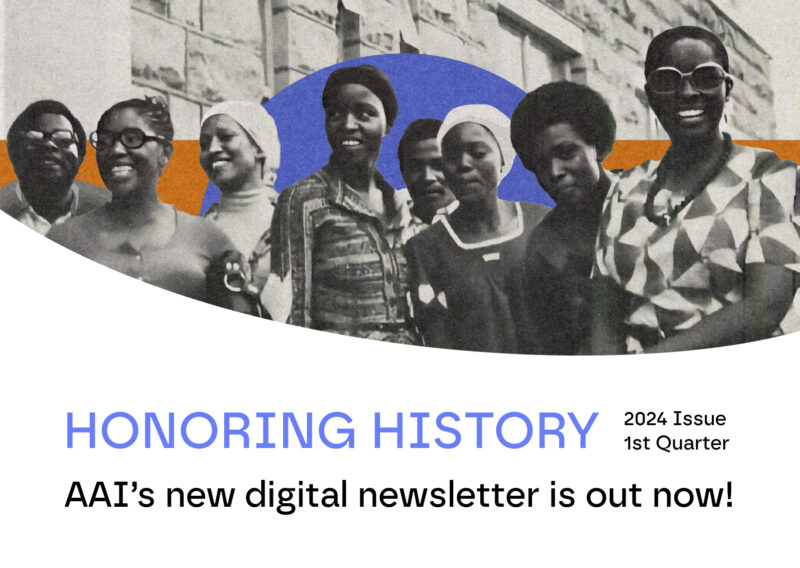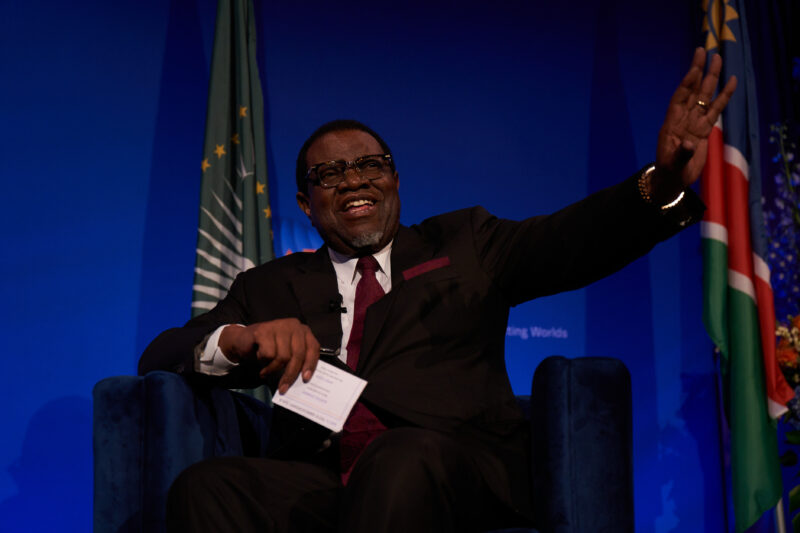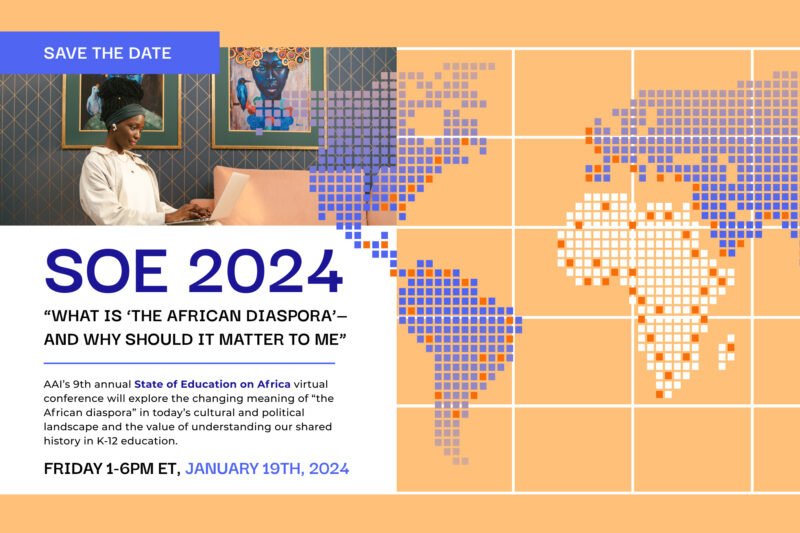AAI’s Education in Africa Conference Presents Concrete Solutions to Improving African Education

Patrick Awuah, founder and president of Ghana-based Ashesi University Credit: Dominique Sindayiganza
“We need to step back and we need to define clearly what the purpose is for basic, secondary, technical and higher education.”
Patrick Awuah, Founder and President of Ghana-based Ashesi University, offered bold advice on transforming Africa’s education system to more than 120 educators and innovators from Africa and the U.S. gathered for AAI’s State of Education in Africa conference on September 9 at the Ford Foundation in New York City.
Awuah delivered the conference’s keynote address where he told attendees that education policy in Africa, such as the Millennium Development Goals, must shift from focusing on boosting enrollment numbers to devoting more attention to why students should be educated.
“We need a deeper purpose of why we educate kids,” said Awuah. “We need to figure out — at the basic education level, secondary school level, technical level and higher education level — what exactly we do and what kind of institutional culture do we want to build. It’s about stepping back and looking at this from a leadership perspective first. And if we do that, then I believe we will see a dramatic change in our educational systems.”

Tade Akin Aina, Program Director of Higher Education and Libraries in Africa at Carnegie Corporation of New York, speaks at a fireside chat with Amini Kajunju.
The education conference sought explore the whys of education and put forth innovative approaches to improving the quality of education at all levels to advance development progress and bolster Africa’s global competitiveness through panel discussions and one-on-one conversations.
Moderated by Liz Berry Gips, Executive Chair of the African Leadership Foundation, the panel “Primary and Secondary Education: Where do we go from here to improve educational outcomes?” aimed to challenge the existing model of basic education and identify new tools and resources to provide students with a higher degree of learning and social development.
Atti Worku, Founder and Executive Director of Seeds of Africa in Ethiopia, said engaging communities, especially youth, is a promising trend in education. “[Youth] can focus on solving their own issues,” said Worku during the panel discussion.
“When we think of leadership, it’s not only looking adults, but it’s about how children are becoming leaders within their communities, as well,” Worku stated.

(L-R): Liz Berry Gips, Executive Chair of the African Leadership Foundation; Boris Bulayev of Educate!; Dmitri Holtzman of Equal Education Law Centre (EELC); Jordyn Wells of Shining Hope for Communities (SHOFCO); and Atti Worku of Seeds of Africa Credit: Dominique Sindayiganza
Other panelists contributing to the discussion included Boris Bulayev, Co-Founder and Executive Director, Educate!; Dmitri Holtzman, Executive Director, Equal Education Law Centre (EELC); and Jordyn Wells, Chief Program Officer, Shining Hope for Communities (SHOFCO).
With greater investment in infrastructure development in Africa, the challenges in vocational and technical education and training were highlighted on the panel, “Vocational and Technical Education Programs as a Pathway to Success”.
“Technical and vocational training involves who’s going to maintain and fix the infrastructure on the continent,” explained Amini Kajunju, President & CEO of The Africa-America Institute, who moderated the discussion.
Panelists discussing this timely topic were Lebogang Mokwena, former Director of Youth Development Programmes, Vocational and Continuing Education and Training (VCET) Branch at South Africa’s Department of Higher Education and Training (DHET); Senthil Kumar, Programme Manager, Eastern & Western Africa, Global e-Schools and Communities Initiative, UN ICT Task Force; and Philip Kwesiga, Professor, College of Engineering, Design, Art and Technology, Makerere University.
Enormous opportunities now exist for graduates receiving vocational and technical education training, especially in the ICT sector, agribusiness and oil and gas industries compared to young people who receive a liberal arts education and may enter a workforce with fewer jobs, noted Dr. George Afeti, Ministry of Education in Ghana’s Executive Secretary on the National Inspectorate Board.
“We’re seeing a paradigm shift in the way young people equip themselves in order to enter into the labor market,” said Afeti.
Panelists debated about the pros and cons of coupling vocational and technical training programs with a liberal arts education during this panel.
During Mokwena’s tenure with South Africa’s Department of Higher Education and Training’s Vocational and Continuing Education and Training, the office created a national certificate vocational program that went beyond technical training to emphasize literacy and numeracy skills. After introducing plans for a textbook that would include a historical context of South Africa’s economy into the coursework, Mokwena said key industries fiercely complained that the curriculum was “diluting” the technical skills that students should attain upon graduation.
“You’re creating ‘airy fairy, esoteric’ young people,” said Mokwena about the complaints from industry officials.
“There was a lot of back lash from employers,” she added.
Yet, Kumar of UN ICT Task Force, said the integration of liberal arts and technology is increasingly important and new opportunities are emerging in the ICT sector.
The panel, “Creating a 21st Century Educational Experience in Africa: Looking beyond enrollment numbers to coursework and methodologies to find solutions for today’s educators”, looked at how African teachers and policymakers can create quality, learning environments to manage a surge in classroom enrollments on the African continent. Dr. Thomas Asher, Program Director, Academia in the Public Sphere and Next Generation Social Sciences in Africa Programs, at the Social Science Research Council (SSRC) moderated the panel.

Teboho Moja of NYU , makes a point during the panel discussion. Dr. N’Dri Assie Lumumba of Cornell University and Dr. Meritxell Roca of Princeton University look on. Credit: Dominique Sindayiganza
The African continent faces a serious crisis in teacher training, starting with the training of trainers at the institution level, warned Teboho Moja, Clinical Professor of Higher Education, NYU Steinhardt School of Culture, Education, and Human Development.
Moja said School of Education departments at African universities are “caught up in a cycle” where education professors are training new teachers when they do not have the education qualifications themselves.
“We’ve pushed these kids into the classrooms, but what is it that we’re giving them? What quality of education, are we giving them?” asserted Moja about the fact that students are not receiving a top quality of education.
Dr. N’Dri Assie Lumumba, Professor of African and Diaspora Education, Africana Studies and Research Center, Cornell University and Dr. Meritxell Roca, Academic Program Manager, African School of Economics, Princeton University also weighed in on the topic.
In a fireside chat with Kajunju on “Emerging Issues and Opportunities in the Education Pipeline in Africa”, Tade Akin Aina, Program Director of Higher Education and Libraries in Africa at Carnegie Corporation of New York, stressed that an education pipeline needs to be developed at the university-level around teaching skills in critical thinking, problem solving, reasoning and being good citizens.
“University education, at the beginning, should be the making of a complete human being who can engage with their society, engaging with their culture, and be experimental, creative and solve problems,” said Aina.
Prior to the September conference, education innovators were invited to submit proposals for individual papers that aimed to go beyond the current thinking and models on education by offering innovative approaches to improving the quality of education in Africa.
The winning paper, entitled “Literacy Challenges and Interventions to Uplift Education in the Royal Bafokeng Nation?” was submitted by George Harris, CEO of Royal Bafokeng Institute, was presented at the conference. Harris’ paper offered insight into how the Royal Bafokeng Nation in South Africa founded an Institute of Education to improve education in existing rural schools. The presentation highlighted the literacy challenges and interventions that have taken place in Grades 1 – 7.
Harris presented the paper and then took questions from attendees during a Q&A.
In addition to Harris’ paper, five papers on innovative approaches to education were selected for publishing on AAI’s website. To view the titles of the selected papers, please click here.




